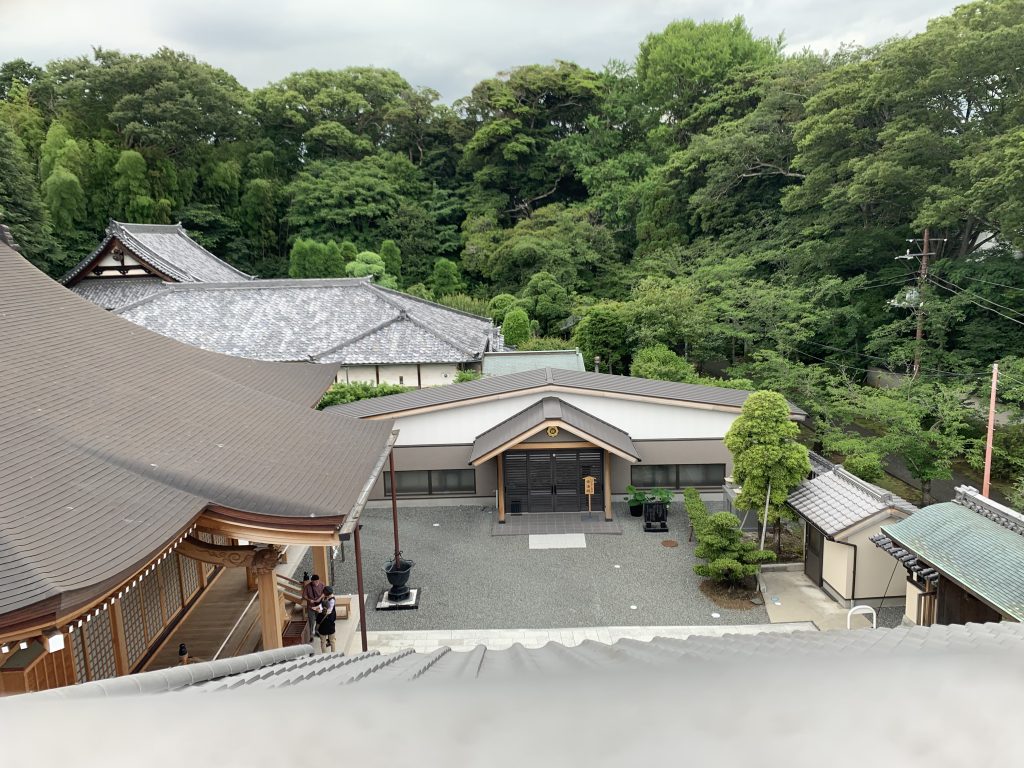第71回 護美捨て
There is an English translation at the bottom of this article. It’s a little bit long, however, please read it when you have time
いつものゴミ捨て
セダンの立派な車から颯爽と降り立ち、ダブルのスーツ姿でゴミを置き、すぐに去っていく紳士。
挨拶を交わす程度の面識しかありませんが、いつも気になる存在でした。
ある日、クスノキの下で車の行き来を待つ時間が長くなり、「今しかない」と思い切って声をかけました。
「いつもお仕事前ですか? スーツ姿の方は珍しくて、素敵だなぁと思っていました」
するとその方は笑いながら、
「いやぁ、私も坊さんなのに感心だと思っていたんだよ。ただなぁ……」
そして続けてこう話されました。
「職場の若い衆に話してみたら、
『え? お坊さんはいつも雑巾がけしてほうき使ってるんだから、そのままゴミ捨てに行っても普通じゃないですか?』
って言うんだよ」
私は耳にしながら、ふと考えました。
- この方は会社の役員で、僧侶と接する機会が多いよう
- その接点は、お通夜やお葬式、つまりご法事が中心なのではないか
- 一方、若い社員の方々は、僧侶との接点が少なく、報道や一般的なイメージから僧侶像を思い描いているのかもしれない
そんな裏付けを試すわけではありませんが、私は軽くこう返しました。
「法事と掃除の場面の僧侶は、少し違いますからねぇ」
すると即座に、
「なるほど、代表としてと、一信仰者としての違いがあるわけか」
驚きました。
幼稚園の女の子に「たくさん遊べた? お腹いっぱいになった?」と聞いたところ、即座に「Enough」と言われたくらいの驚きです。
導師という立場で代表してお経をあげる場面と、ほとけさまへの奉仕として掃除をする場面の違いを、寸分違わず言葉にされたからです。
同時に、社長さん(もう勝手にそう呼んでいます)も、何かに気づかれたようでした。
帰り際、ニッコリ笑ってこう言われました。
「いやぁ、ヒントをもらった。またいろいろ話そう」
私は、あの笑顔の意味をこう捉えています。
自分のビジョンが、そのまま人にも同じように見えているとは限らない。
凝り固まって偏って、聞く耳を持たない。持てないようにはなりたくない。
日蓮聖人は、数々の迫害を乗り越えてこられました。
お手紙の一文をご紹介します。
これらの経文、私の義にあらず。仏の誠言にて候へば、定てよもあやまりは候はじ。
(私の勝手な考えではない。仏の誠の言葉をもって判断しているから、少しの偏りも、あやまりもない)
優劣、決めつけ、思い込み。これはすぐに拭えないものです。
一瞬、一言、一日。
僅かなきっかけだけで偏りのフィルターを取り払うのは難しい。
だからこそ、まずは理解し、一つずつ捨てていかないと。
ゴミ袋を手にしながら、そう思うのです。

No. 71: Discarding Beauty
A gentleman dashes out of a fancy sedan, puts down his trash in a double-breasted suit, and promptly leaves.
I’d only ever known him enough to exchange greetings, but he’d always intrigued me.
One day, I was waiting for a long time under a camphor tree for cars to pass, and I decided, “Now’s the time,” I decided to speak to him.
“Are you always here before work? It’s rare to see someone in a suit, and I thought it was very handsome.”
The man laughed and said,
“Well, I’m a monk, so I thought it was impressive too. But…”
He continued,
“I told the younger guys at work about it, and they said,
‘Huh? Monks always mop the floor and use brooms, so isn’t it normal for them to just go and throw out the trash?'”
As I listened, I made a few inferences.
- This person is a company executive, and it seems he has frequent contact with monks.
- His main contact with monks is likely wakes and funerals, i.e., memorial services.
- On the other hand, the younger people in the company have little contact with monks, and may have an image of a monk based on popular images and media reports.
I wasn’t trying to verify this, but I added a little jabbing comment: “There’s a slight difference between a monk at a memorial service and a monk cleaning.”
He immediately replied,
“I see, so there’s a difference between a monk as a representative and a monk as a believer.”
I was surprised.
It was as surprising as when I asked a little girl in kindergarten, “Did you have enough fun? Are you full?” and she immediately replied, “Enough.”
He had articulated the exact difference between chanting sutras on behalf of the group as a leader and cleaning as a service to Buddha.
At the same time, the president (I’ve taken to calling him that) also seemed to realize something.
As I was leaving, he smiled and said, “That gives me a hint. Let’s talk more about this,” as he got into his car.
This is how I interpret the meaning of that smile.
Your vision may not be exactly the same as your own.
You can become rigid and biased and not listen. I don’t want to become that way.
Nichiren Shonin overcame numerous persecutions.
Here’s a passage from one of his letters:
These sutras are not my own teachings. Since they are the Buddha’s sincere words, there can be no error.
~These are not my own opinions. Because I judge based on the Buddha’s sincere words, there is no bias or error.~
Superiority and inferiority, preconceptions, and assumptions. These are things that cannot be wiped away immediately.
A moment, a word, a day.
It’s difficult to remove the filter of bias with just a small trigger.
That’s why I must first understand them and discard them one by one.
With a garbage bag in hand.